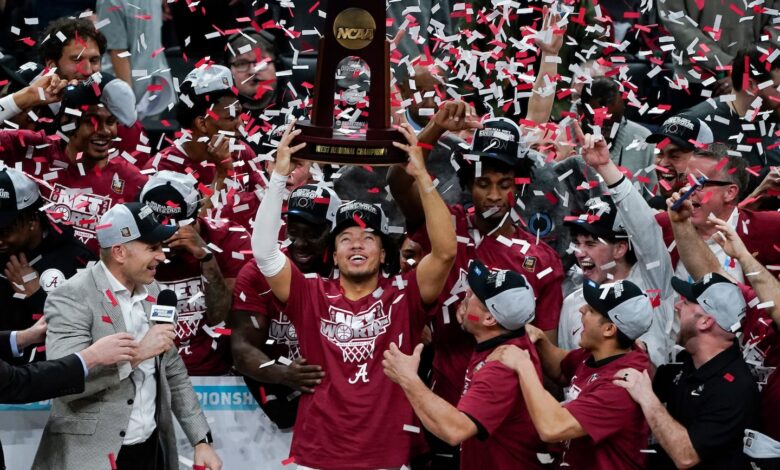Alabama’s first Final Four run, fueled by an ancient Indian concept

Those historical matters from a side of Earth where almost nobody fills out brackets do relate to the Crimson Tide as it prepares to play Connecticut, though, because of something that happened in early January when its season looked muddled. That’s when the players heard the word they have been bringing up at interview daises in March and early April, for a concept Buddhaghosa stressed: “mudita.”
It means the vicarious and unselfish joy in the successes of others, a rather flawless way to approach something as collaborative as basketball, and its complex history traces to and through those far-flung beginnings. It came to Alabama players in another worn-out, time-honored tradition: a speech from a softball coach. Basketball coach Nate Oats requested that speech in early January, when the Crimson Tide had lost to Ohio State, Clemson, Purdue, Creighton and Arizona. Of all the speakers brought to all the teams in all the sports, many of which go into ears and out of others, this one stuck.
In Los Angeles, when No. 4 seed Alabama upended No. 1 North Carolina and then beat No. 6 Clemson to win the West Region, Tide role player Jarin Stevenson told of how his teammates bolstered him even when he shot “my two air-ball threes,” and listeners knew “mudita” had to be a powerful component if it could ameliorate the strain of two air-ball threes.
Mark Sears, Alabama’s star, followed then with how the word “really stuck with us and really changed our season around,” and how “you could see it on our face cheering for others when they’re succeeding even though we’re not succeeding,” and how it “really helped us [reach] this Final Four because of ‘mudita.’ ”
That softball coach, Patrick Murphy, who has helmed Alabama since 1999, was unable to comment late this week with a weekend series upcoming against Mississippi, but in the Alabama student newspaper the Crimson White, Orry Cantrell told of how Murphy discovered “mudita” in late 2013 while in bed reading Kevin Pritchard and John Eliot’s “Help the Helper: Building a Culture of Extreme Teamwork.” When Murphy saw “mudita” in the third chapter, Cantrell wrote, he sprang from bed realizing he “finally found a name for the sermon he has been preaching to his players” during his Alabama years, which have featured 1,264 wins, 14 appearances in the College World Series and one national championship.
By now, the word rang again in interview room after interview room Friday, when “mudita” got its first known turn as a Final Four-related term. With no apparent English equivalent even while having opposites — with “jealousy” and “schadenfreude” among those — it might matter just to have the word itself. That seemed clear in the answer of 6-foot-10 forward Nick Pringle, who said his mother, Kwajalean, had always aimed to instill the relevant qualities. “I feel like ‘mudita’ is something that I’ve always had within me,” he said, “but it’s just a word that I’ve never heard before, and by me having that word, it’s made it easy for me to spread it.”
While 6-3 guard Aaron Estrada found the meaning of the meeting with Murphy paramount, he did point to the fresh sound of the word as helping it stick. “I’d never heard it before,” he said. “It was a very different word. So I think also that’s why it was also able to resonate with us a little more because it’s a word that we’re not used to, either.”
“Yeah,” 6-6 sophomore guard Rylan Griffen said, “so the coaches, they preached that, but there wasn’t a word for it, so he came in and he made a word for it, so now, like, instead of having to try to explain what we should be doing, you just say a word, and it all, like, resonates back. We all know what to do.”
Grant Nelson, the 6-11 senior forward who will have to deal with Connecticut’s Donovan Clingan in the national semifinals, sensed an immediate tone change once “mudita” entered the brain waves. “Yeah, Coach Murphy, he came and talked to us about ‘mudita,’ which is vicarious joy for another’s success, and I mean, they win a lot of games at softball, and if you watch — he showed us videos, where they celebrate the littlest of things, and that, like, motivates them to step up and try to do good for their team,” Nelson said. “So when he first implemented that, told us that, and we kind of implemented it into our program, I mean, I just felt different energy, a different love from our guys. Yeah, it definitely takes more energy to do but once it gets going, it’s just guys celebrating every little thing, it gives us a little more motivation, to help our teammate out, tell them good things. It’s just great what a little bit of positive energy will do.”
Everyone agreed, without any prompting, that it qualified as pivotal.
“It came at the right time,” Griffen said. “We were a little bit down, and he came in and brought positive energy and showed us, like, even when negativity happens you can still make it a positive situation, and a lot more positive things will happen.”
“The word ‘mudita,’ ” Sears said, “having vicarious joy through others’ success, even though you may not be playing to your best . . . and you know, just being joyful for others, that’s really how we got here, and that’s really what brought us to our success.”
“Around the time where we had that speech from our softball coach,” Pringle said, “we were still finding our identity. We were still finding out our whys and what we were good at. And I feel like that was definitely the [turning] point, the ‘mudita’ thing.” That was when the Tide realized “this is more than just about for ourselves. We’ve got to do this for each other. We’ve got to be happy for everybody in the locker room.” It stoked “another connectivity to ultimately be where we are today.”
As Estrada put it, “The ‘mudita’ thing was probably the best thing that happened for this team, honestly,” stressing that it replaced thoughts about acts that might seem selfish, such as missing an open teammate. “I feel like when Coach Murphy spoke to us about the ‘mudita’ thing I think it changed our whole season.”
By the end, Buddhaghosa would have approved of Alabama.




